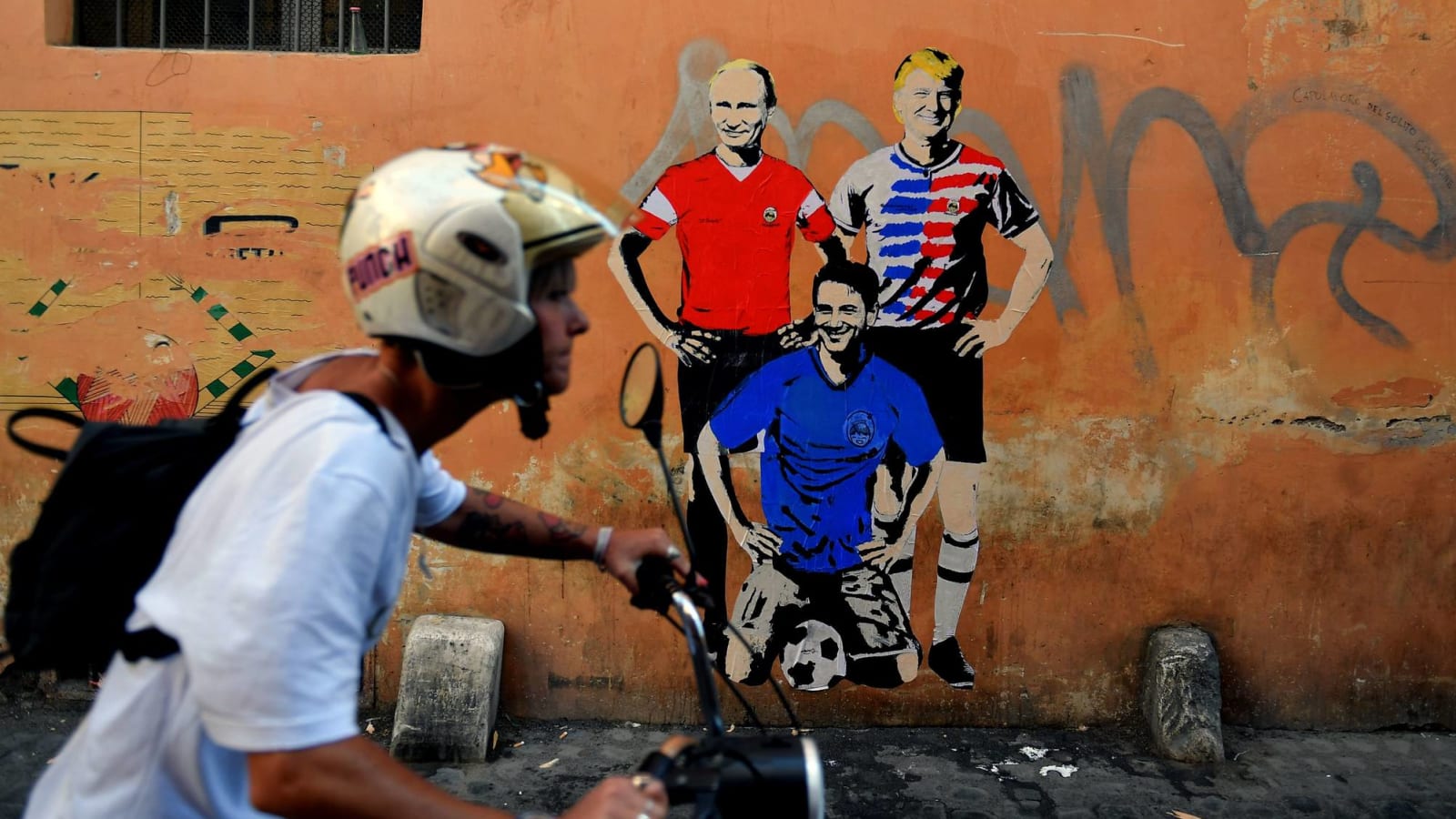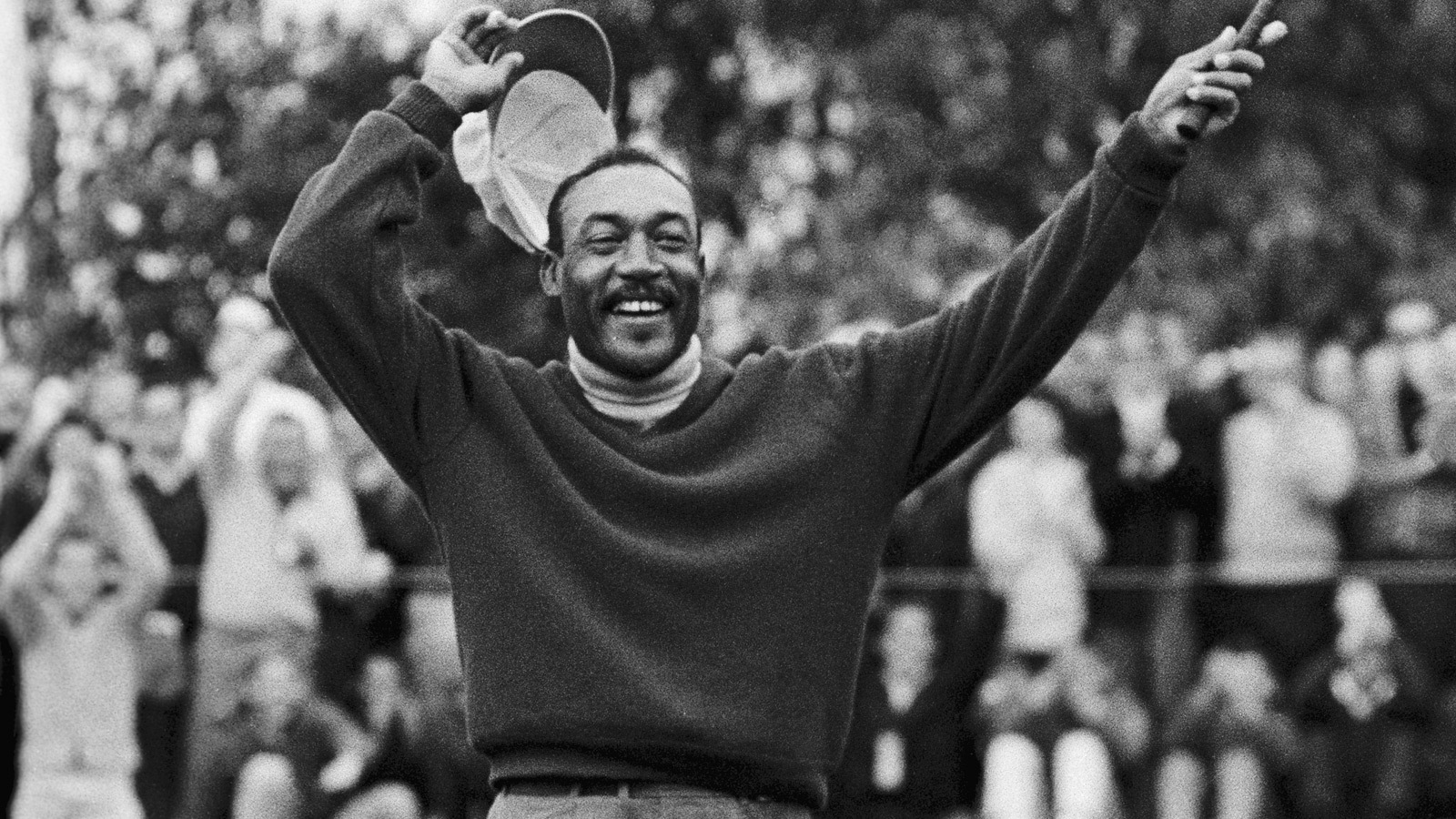
Sports & Politics Intersect: The world plays ball on Putin's pitch
"I would like to underline that FIFA is committed to the principle of keeping politics out of sports. Russia has always adhered to such approaches and is striving for the closest cooperation with everyone who is determined to develop and enhance a creative beginning for sports and its boundless humanistic potential." - Vladimir Putin, Russian president
Despite Vladimir Putin's wish, whose country is hosting the 2018 FIFA World Cup (a major coup for him), politics became a focal point of the global tournament well before the first match kicked off.
Part of it can be attributed to Russia's own crackdown of dissidents both foreign and domestic. On Thursday, British human rights activist Peter Tatchell was arrested on Thursday after protesting in front of the Kremlin with a sign criticizing Putin's silence on the Chechen persecution of gay people. Tatchell was eventually released on bail. And speaking of the gay community and Russia, Irish bookmaker Paddy Power promised earlier this week to donate £10,000 to LGBT+ causes every time Russia scored during the tournament — so far, they've scored five goals.
(A Russian politician also asked Russians to not engage in sexual relations with foreigners, which drew accusations of xenophobia before he was forced to roll back his comments. Dmitry Peskov, a spokesperson for Putin, told reporters, "As for our Russian women, they will make their own judgment. They are the best women in the world.")
It's not just Putin facing backlash. Liverpool and Egyptian superstar Mo Salah was thrust in the middle of a controversy after Ramzan A. Kadyrov, Chechnya's autocratic leader and Putin ally, reportedly woke Salah up from sleep for a photo op (Egypt set up camp in Chechnya for the duration of the tournament). The images prompted Kick It Out, the organization that aims to remove homophobia from the beautiful game, to issue out a statement decrying the politically motivated meet-and-greet.
Salah is only the latest footballer to be criticized for an inopportune photo. For the last month, German players Ilkay Gundogan and Mesut Ozil, both of Turkish descent, have been in the hot seat after posing with and endorsing Recep Tayyip Erdoğan, the dictatorial president of Turkey who's hoping to be re-elected in an upcoming election. The international fracas forced German prime minister Angela Merkel to declare that both players were very much a part of the German national team. Despite Merkel's assurances, expect Gundogan and Ozil to be booed when they take on the Mexican national team, the most popular international squad in the United States, on Sunday.
And finally, there's the United States. The USMNT might not be in Russia right now, but they can rest easy that they're already qualified for the 2026 World Cup, after FIFA awarded Mexico, the U.S., and Canada hosting duties over Morocco for said tournament. Never one to miss an opportunity to take credit, Donald Trump tweeted on Friday that the three nations had been awarded the World Cup in large parts thanks to him. And while there might be some validity to his statement, the head of the German soccer federation disputed the claim, saying that the North American trio won in spite of him.
Need to know now:
MSU president promised kickback to Nassar victim - According to emails uncovered by The Chronicle of Higher Education, Michigan State University interim president John Engler didn’t refute an accusation of trying to pay off Kaylee Lorincz , a former gymnast victimized by Larry Nassar, in a private meeting without her lawyer present. (The school board released a statement regarding the controversy.) A separate string of emails within the Steering Committee provided insight on how the former Michigan governor became the school’s interim president. Despite calls to resign, Engler has no plans to step down. As the state legislature approves of two bills that would provide further support for sexual assault victims, a seventh MSU employee is being investigated by the state’s licensing agency.
Most Capitals would visit the White House - As Alexander Ovechkin continues the greatest victory lap of all time, he and most of his fellow Washington Capitals said that they would visit the White House , offering varying perspectives on why they would attend a celebration of their Stanley Cup win there. (Forward Devante Smith-Pelly previously said he would not go.) Yet, just a day after bringing Lord Stanley to the nation’s capital, senior advisors Ivanka Trump and Jared Kushner joined the team in celebration of their win at a swank DC restaurant.
Warriors invited to Capitol by congressional Dems - Nancy Pelosi and Barbara Lee, two prominent congresswomen and native Californians, invited the Golden State Warriors to visit the U.S. Capitol in place of the White House. NBA commissioner Adam Silver, however, is saddened that President Trump continues to shun the NBA champions.
Eagles and Warriors? No. Sean Hannity’s son? Yes! - If anything, the Warriors and Philadelphia Eagles not visiting 1600 Pennsylvania Avenue could have opened up opportunities for other sports champions to be feted. That spotlight went to the Wake Forest men’s tennis team, which happens to include the son of one of the president’s favorite people, Fox News commentator Sean Hannity.
New Jersey finally opens sportsbooks post SCOTUS ruling - Over a week after Delaware’s casinos began their sports gambling operations, New Jersey followed suit, with Governor Phil Murphy making the first legal wagers in the state at the Monmouth Park racetrack, then later placing bets in Atlantic City.
No more NFL biz for Diddy after anthem rule - Losing the bid for the Carolina Panthers didn’t sour Sean "Diddy" Combs on trying to buy another NFL franchise as much as it was the controversial national anthem policy the league set in motion. The hip-hop star and entrepreneur said, “I don’t want to be associated with oppressing black men.”
Clearwater asking for public dollars to revamp Phillies’ spring training home - The Tampa Bay city of Clearwater, Florida wants to secure $69 million in public funding to renovate the 14-year-old Spectrum Field in hopes of keeping the Philadelphia Phillies from leaving their spring training home. Beating the Rays in the 2008 World Series wasn’t enough for the Fightin’ Phils?
Carey Price encourages men to take paternity leave - In a new advertisement for Dove Men+Care, Montreal Canadiens goaltender Carey Price is trying to encourage men to take paternity leave to spend time with their newborn children. The campaign is hoping to combat certain stigmas and rules against fathers requesting the time off.
Trump’s sons open new golf clubhouse - In the president’s home city, his sons Donald Jr. and Eric, opened a new clubhouse at the Trump Golf Links at Ferry Point in The Bronx. Unsurprisingly, the sons offered little information on how well the family fares in the golfing business, but the three-year old, New York City-owned course has been slumping some as of late.
WNBA, the activist league - A new campaign by the WNBA, “Take a Seat, Take a Stand” has brightened the spotlight on its players’ collective activism efforts as well as started a conversation about league-wide initiatives on social justice and gender equality.
Anne Donovan’s impact on growth of women’s basketball - Former coach and player Anne Donovan passed away at the age of 56. A trailblazer as the first woman to win the Naismith Award in 1983 and the first female coach to win a WNBA title in 2004 with Seattle, Donovan had been part of the evolution of women’s hoops for four decades.
T rump has a friend in Clay Buchholz - Like several other sports figures in the face of political discord, Arizona Diamondbacks pitcher Clay Buchholz has a different appreciation for the Commander-in-Chief versus most. After all, it was Trump who introduced him to his now-wife.
This week in sports and politics history: Charlie Sifford breaks the color barrier at the U.S. Open

“Didn’t anyone think I was going to get this far. It’s like Nelson Mandela. They kept him in jail 25 years, but it didn’t break his determination. They couldn’t break mine.” - Charlie Sifford on his desire to play on the PGA Tour
Jackie Robinson asked Charlie Sifford if he was a quitter. Sifford, who had just returned from active duty in World War II, told Robinson that he most certainly was not, and set off to become one of golf’s salient pioneers.
Sifford fell in love with golf while working as a caddie at 10 years old at a North Carolina country club, bringing home 60 cents a day and playing the links on Mondays, when the course was closed to members. At 13, he was shooting par, and at 17, he was run off the course because the members thought the black kid chewing on cigars was becoming too good at their club.
Sifford spent a few years working in a bakery and hustling at golf clubs in Philadelphia before heading to war. In 1943, while he was at war in Japan, the PGA of America created a "Caucasians only from North or South America" rule, that would keep Sifford out of the major professional tournaments during the prime of his career.
Without the ability to play on the PGA tour, Sifford played most of his golf on the United Golf Association Tour, where most of the black golfers in the 1950s teed off professionally. He participated in a few PGA sponsored events that didn’t require a tour card, winning the Long Beach Open in ‘57 along the way.
It wasn’t until 1961 when Stanley Mosk, the attorney general of California, stepped in to threaten the PGA to move its upcoming PGA Championship from Los Angeles to Pennsylvania, that the PGA removed its “caucasians only” rule, opening the door for Sifford to play on the tour.
Unfortunately, Sifford was already in his late 30s with his best golfing years behind him, but he did go on to earn more than $341,000 on the regular tour and more than $1 million altogether as a professional. He was an original member of the Senior Tour, which was founded in 1980, and he won it in its inaugural year.
Sifford died at age 92 in 2015, but not before receiving the Presidential Medal of Freedom from President Barack Obama in 2014. Sifford didn’t just prove to Robinson that he wasn’t a quitter, but in the eyes of many, including Tiger Woods, he became the Jackie Robinson of golf, kicking down racial barriers so men and women of color would have the opportunity to live out their dreams on any course in the country.
More must-reads:
- Watch: Dennis Rodman cries on CNN while talking summit
- Trump: Anthem-protesting players 'shouldn’t get the politics involved'
- The '100 catches in an NFL season' quiz
Breaking News
Customize Your Newsletter
 +
+
Get the latest news and rumors, customized to your favorite sports and teams. Emailed daily. Always free!

